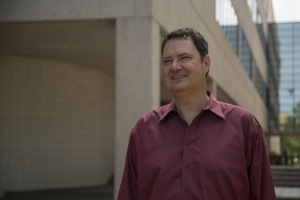Richard Willson, Huffington-Woestemeyer Professor of chemical and biomolecular engineering at the University of Houston Cullen College of Engineering, has been named a fellow of the American Chemical Society (ACS), the world’s largest scientific society. He will be formally honored with this recognition at a special ceremony at the ACS National Meeting in San Francisco on August 11.
According to the ACS website, the ACS Fellows Program was created in 2008 to recognize ACS members for outstanding achievements in and contributions to science, the profession, and the society itself. There are currently less than 1,000 total ACS Fellows in the U.S.
“I’m very excited and proud of this. It’s a very honorable distinction,” said Willson. “ACS has been my professional home and, in a lot of ways, my professional family for many years, so this is especially meaningful to me.”
As a longtime member of ACS, Willson has been very involved in the organization, serving as the chair of the division of Biochemical Technology at ACS as well a member of the editorial board for Biotechnology Press, a journal co-organized by ACS. In 2001, Willson won the James M. Van Lanen Distinguished Service Award from ACS, which recognizes outstanding contributions to ACS’ division of biochemical technology.
“I gave my first professional presentation at an ACS meeting,” he said. “I encourage all of my students to attend ACS meetings, and many of them have been involved in ACS, especially the Biochemical Technology division.”
Willson also noted that he represents the third of four generations of his family in a row to be members of the ACS. “My grandfather was a chemist, my father is a chemical engineer, I’m a chemical engineer, and my son is a biochemist – and we’ve all been members of ACS,” he explained. “We’re very much an ACS family, which makes this pretty special.”
In addition to his contributions to ACS, Willson has made a significant impact on the field of biomolecular recognition and its applications to molecular diagnostics through his research efforts. Much of his work centers on using biomolecular recognition to diagnose cancer and infectious diseases – research which earned him the first-ever distinction of “Huffington-Woestemeyer Endowed Chair in Biomolecular Engineering” last year. The endowed chair was established thanks to generous gifts totaling $2 million from supporters Ronald and Mariette Woestemeyer along with Dr. Ralph Dittman and his wife, Terry Huffington of the Huffington Foundation. The gift is intended to support research that will lead to earlier diagnosis and treatment of diseases and ultimately save lives.
Willson’s work clearly applies. Much of his research centers on developing highly sensitive disease diagnostic systems. For example, when an individual becomes ill, their blood often contains pathogenic organisms, or cancer biomarker proteins, in very small amounts. Willson and his collaborators cover micro- and nano-scale particles with specific antibodies that can bind to the pathogen or biomarker, and then build systems that can identify if even a single particle has bonded. With this approach, they are able to detect the smallest signals of the presence of a disease, which allows them to diagnose diseases in their earliest stages. He is applying this approach to a number of diseases including Norwalk and Dengue virus infections, and several types of cancer for which promising biomarkers have been identified.
Willson was also recently recognized by national media outlets for a research collaboration in which he and assistant professor of electrical and computer engineering Jiming Bao developed a method for diagnosing diseases using a smartphone and a $20 lens attachment for the phone’s built-in camera.
In addition to ACS, Willson was named a fellow of the American Institute for Medical and Biological Engineering (AIMBE) in 1999 and the American Association for the Advancement of Science (AAAS) in 2011.
Despite his highly productive career, Willson continuously mentors and trains undergraduate, graduate and postdoctoral students. In 2009, he was honored with the Cullen College’s Fluor Daniel Faculty Excellence Award, the highest-level award given by the college.
Willson earned both his bachelor’s and master’s degrees from the California Institute of Technology and his Ph.D. in chemical engineering from the Massachusetts Institute of Technology in 1981, 1982 and 1988, respectively. He joined the faculty at UH in 1988, and currently holds joint appointments in biomedical engineering and biochemical and biophysical sciences.
